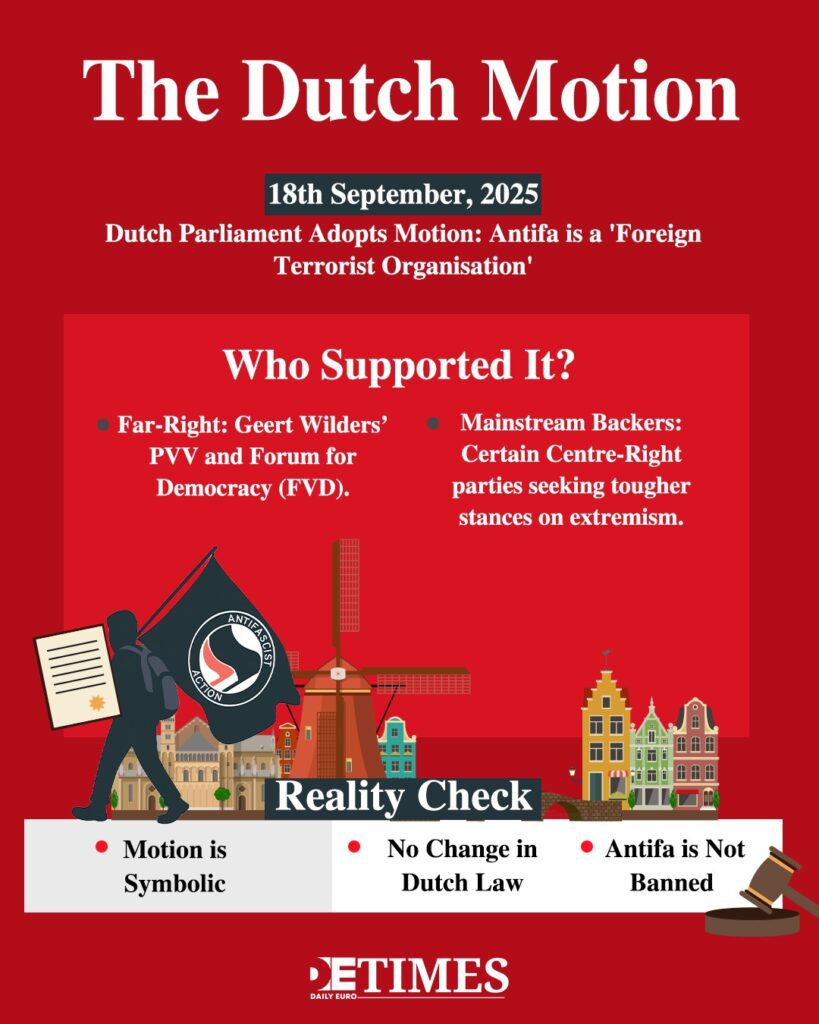On 18 September, the Dutch parliament passed a motion requesting that Antifa be officially designated as a “terrorist organisation”, just days after the US issued a similar executive order under Trump’s administration. The Dutch motion followed the U.S. example by only a few days.
Most members of the Dutch lower house support the idea of following the US by labelling the far-left Antifa movement as terrorist.
The motion was backed by Geert Wilders’ PVV, Forum for Democracy, and several centre-right parties.
However, such motions are recommendations, not legally binding decisions. So despite what some online claims say, the Netherlands has not actually banned Antifa.
The government still has full discretion over whether or how to carry this out, as the government retains control over actual implementation.
Labels Without Legal Substance
A parliamentary motion carries political weight but does not force government action.
The Dutch cabinet is not obliged to implement the Antifa terror designation, even after this vote.
Similar motions might appear elsewhere in Europe. Hungary is reportedly considering something similar, whilst British Prime Minister Keir Starmer was asked about the group in a press conference at Checkers alongside President Trump last week.
Legislatures can ask the executive branch to act, but these requests don’t guarantee anything will happen. Such motions can resurface in various European countries.

Transatlantic Political Mimicry
US political labels increasingly shape debates in European countries. Dutch parliamentarians openly cited Trump’s order as justification.
Yet Europe has different political systems from the U.S.: different constitutional setups, legal traditions, and histories of protest.
Copying U.S. policies directly ignores these differences and risks importing American political divisions outright. This American influence is increasingly noted in European policy discussions, but only on the fringes of the European right.
The Elasticity of Terror Classifications
Traditionally, terrorist labels have been applied to organised groups with clear leadership.
Antifa, by contrast, is a decentralised movement with no single leader, made up of independent local groups.
The motion, pushed by representatives including Lidewij de Vos (FVD), Geert Wilders, and Caroline van der Plas (BBB), accuses Antifa of “threatening politicians, disrupting public events, and intimidating citizens.”
But these point more to individual acts than an organised, coordinated campaign, as these accusations describe individual actions more than a unified strategy.
Chilling Effects on Civil Society
Broad security labels can have a chilling effect on legitimate political expression.
Activists who operate within the law may come under heavier surveillance or investigation.
In the Netherlands, lawmakers urged the government to increase monitoring of Antifa networks, toughen penalties for members, and break up associated groups.
Such measures could affect a wide range of civil society organisations, since anti-fascist views exist in many political parties, unions, and community groups.
Surveillance often ends up targeting broader activist networks than initially intended, which such measures could encompass.
European Sovereignty in Security Matters
European countries have their own methods for assessing security threats, based on local circumstances.
U.S. designations reflect American political priorities and legal interpretations.
European legal frameworks for handling political violence or disruption differ, too. Adopting U.S. categories risks subordinating Europe’s independent security assessments to foreign political agendas.
Europe benefits from evaluating threats based on its own interests, something European intelligence services do based on local conditions.
Constitutional Tensions
Rights like free speech and assembly are core to European constitutions.
Security policies must balance public safety with these fundamental freedoms.
Courts often carefully examine broad security labels applied to political groups. Judicial reviews can overturn government actions that overstep constitutional limits.
Motions like this test those boundaries and any real implementation would likely face legal challenges on proportionality and necessity grounds, as courts typically scrutinise such broad designations.
Democratic Accountability Gaps
Non-binding parliamentary motions allow politicians to raise security issues without being responsible for the practical outcomes.
Executives must work within legal frameworks, constitutional protections, and international rules when deciding on security measures.
Parliamentary votes in these cases are often symbolic gestures, lacking detailed policy follow-through. This creates political theatre instead of effective governance. The Dutch motion shows how legislators can create headlines without delivering real improvements to security policy.
Europe needs more thoughtful ways to address political violence that respect constitutional rights. European leaders should assess security threats based on their own context rather than copy American political labels.
Good governance means distinguishing genuine policy needs from political mimicry across the Atlantic, something they should evaluate carefully.
Keep up with Daily Euro Times for more updates!
Read also:
A Martyr is Political Capital: Meloni Links Kirk Assassination to Red Brigades
Two Tragedies, One Narrative: How American Politics Crossed the Pond
Prosecutors Drop Case Against Mathilde Panot






